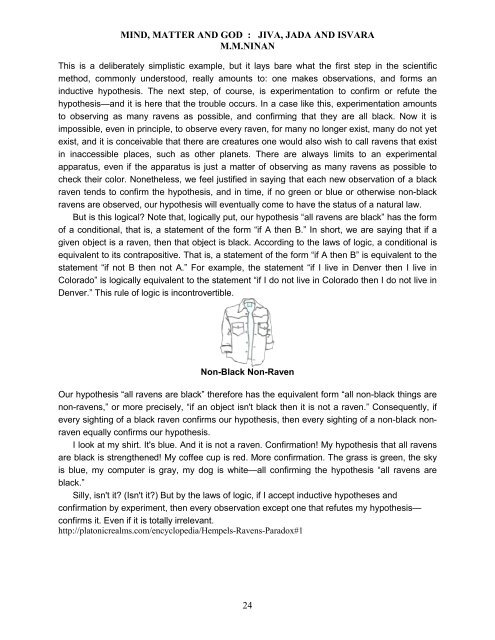Jiva
Create successful ePaper yourself
Turn your PDF publications into a flip-book with our unique Google optimized e-Paper software.
MIND, MATTER AND GOD : JIVA, JADA AND ISVARA<br />
M.M.NINAN<br />
This is a deliberately simplistic example, but it lays bare what the first step in the scientific<br />
method, commonly understood, really amounts to: one makes observations, and forms an<br />
inductive hypothesis. The next step, of course, is experimentation to confirm or refute the<br />
hypothesis—and it is here that the trouble occurs. In a case like this, experimentation amounts<br />
to observing as many ravens as possible, and confirming that they are all black. Now it is<br />
impossible, even in principle, to observe every raven, for many no longer exist, many do not yet<br />
exist, and it is conceivable that there are creatures one would also wish to call ravens that exist<br />
in inaccessible places, such as other planets. There are always limits to an experimental<br />
apparatus, even if the apparatus is just a matter of observing as many ravens as possible to<br />
check their color. Nonetheless, we feel justified in saying that each new observation of a black<br />
raven tends to confirm the hypothesis, and in time, if no green or blue or otherwise non-black<br />
ravens are observed, our hypothesis will eventually come to have the status of a natural law.<br />
But is this logical? Note that, logically put, our hypothesis “all ravens are black” has the form<br />
of a conditional, that is, a statement of the form “if A then B.” In short, we are saying that if a<br />
given object is a raven, then that object is black. According to the laws of logic, a conditional is<br />
equivalent to its contrapositive. That is, a statement of the form “if A then B” is equivalent to the<br />
statement “if not B then not A.” For example, the statement “if I live in Denver then I live in<br />
Colorado” is logically equivalent to the statement “if I do not live in Colorado then I do not live in<br />
Denver.” This rule of logic is incontrovertible.<br />
Non-Black Non-Raven<br />
Our hypothesis “all ravens are black” therefore has the equivalent form “all non-black things are<br />
non-ravens,” or more precisely, “if an object isn't black then it is not a raven.” Consequently, if<br />
every sighting of a black raven confirms our hypothesis, then every sighting of a non-black nonraven<br />
equally confirms our hypothesis.<br />
I look at my shirt. It's blue. And it is not a raven. Confirmation! My hypothesis that all ravens<br />
are black is strengthened! My coffee cup is red. More confirmation. The grass is green, the sky<br />
is blue, my computer is gray, my dog is white—all confirming the hypothesis “all ravens are<br />
black.”<br />
Silly, isn't it? (Isn't it?) But by the laws of logic, if I accept inductive hypotheses and<br />
confirmation by experiment, then every observation except one that refutes my hypothesis—<br />
confirms it. Even if it is totally irrelevant.<br />
http://platonicrealms.com/encyclopedia/Hempels-Ravens-Paradox#1<br />
24


















